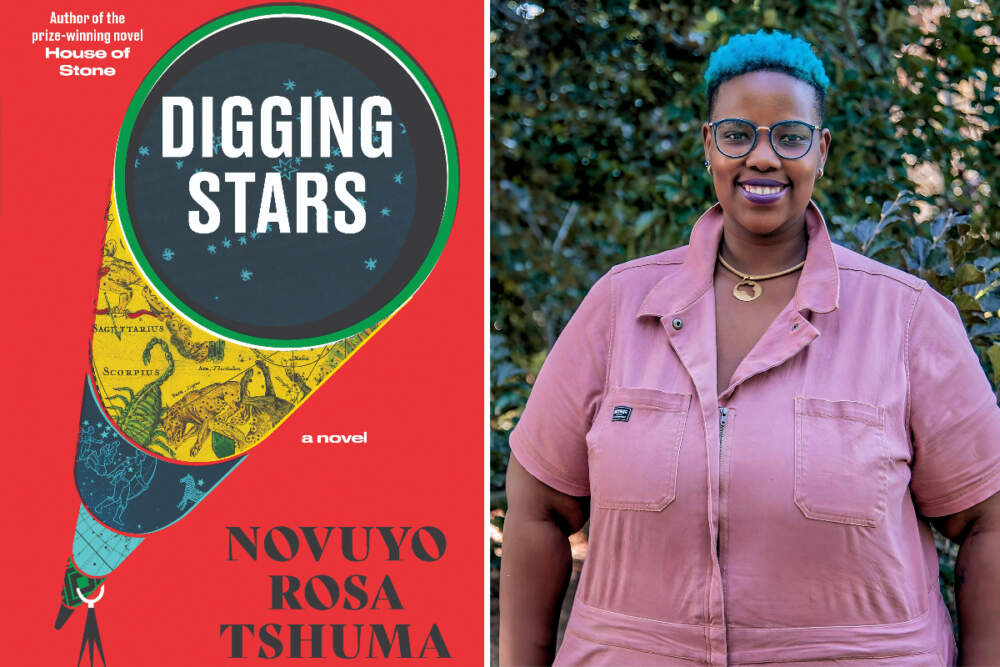Advertisement
Review
New novel 'Digging Stars' explores the subjectivity of human perspective
Messier 45 is the “official” name for a cluster of hot, blue stars whose luminosity has attracted the attention of Earthbound observers since ancient times. Its prominence in the night sky has made it the subject of numerous folk tales and myths throughout history. In fact, it has many different names across cultures — the Greeks called it the Pleiades, the Japanese knew it as Subaru and to the Ndebele people of Zimbabwe, it’s known as IsiLimela, the “digging stars.”

For Novuyo Rosa Tshuma, the Boston-based, Zimbabwe-born novelist behind “Digging Stars,” Messier 45 is a metaphor for the subjectivity of human perspective and the strange paradoxes of human culture, in which peculiar similarities and insidious differences exert an inescapable, tidal force, continually drawing us together and tearing us apart.
Irrespective of time and place, humans of all cultures have found significance in the night sky, often in strikingly similar ways despite vast gulfs of time and geography. Both the ancient Greeks and aboriginal Australians interpreted Messier 45 in a similar fashion — as seven sisters fleeing the unwanted advances of a pursuing man (the nearby constellation of Orion). Such similarities speak to a universal human heritage and imagination.
But it’s important to remember that these interpretations are based on an illusion. On the flat plane of the sky, the stars of Messier 45 appear to us as if they form a tight cluster. In the reality of three-dimensional space, however, they are solitary travelers separated from one another by trillions of miles. Any sense of togetherness we see is a trick of perspective.
As a novel, “Digging Stars” is very much concerned with these themes — the friction of intercultural exchange among superficially similar yet starkly different peoples and the illusory beauty of bright objects (say, a foreign country or famous father) viewed from great distances.
Tshuma’s protagonist, Athandwa, has come to the United States from Zimbabwe to attend “The Program,” a scientific graduate studies fellowship that’s something of a cross between the Sante Fe Institute and the Iowa Writers’ Workshop (of which Tshuma is an alum). She is following in the footsteps of her father, Frank, an astrophysicist who abandoned her family in Zimbabwe when Athandwa was a young child. In the U.S., he became a “celebrity academic” who was instrumental in detecting the first exoplanets and even got to ride on the International Space Station. Athandwa idolizes her father and his accomplishments, all the more so after his tragic (and suspicious) death in a car accident.
Like its namesake, “Digging Stars” can appear to be many things depending on how you look at it: a campus novel about a culturally diverse group of nerds struggling to understand one another; a thriller about a government conspiracy and the too-cozy relationship between academia and the defense industry; a satire about the greedy pipe dreams of billionaires looking to conquer space; a fish-out-of-water story about an immigrant coping with a strange, new environment; a trauma novel about a young woman’s struggle to overcome her feelings of abandonment. It tries to be all of these things at various times, which gives the book the illusion of depth. But it struggles to commit to any of them, and as such, the story has a herky-jerky feel. Many promising threads are, perplexingly, left unexplored.
Advertisement
The one consistent throughline in the book is the relationship between Athandwa, her roommate Shaniqua and her estranged half-brother Péralte, who are both also in The Program. These are the book’s most revealing sections, where the prissy Athandwa, who is proud of her perfect English and good manners, discusses and debates matters of race, colonialism and capitalism with her less-polished American foils. They challenge her perception of the U.S. as a land of unbridled opportunity for all and force her to reinterpret her upbringing in Zimbabwe in the context of the broader struggle of indigenous cultures against white imperialism. In turn, she dispels their stereotypical and patronizing ideas of what Africa is like. These conversations are eye-opening (and at times disturbing) for Athandwa, though at the end of the book, it’s unclear how much she’s taken these lessons to heart.
However, Tshuma’s prose does exhibit flashes of brilliance, particularly in an extended dream sequence when a younger Athandwa imagines visiting Jupiter with her father. “All around us was a translucent fog,” she writes. “Nebulous cumulonimbi floated before us, emitting a bioluminescent glow, like an alternating swarm of fiery fireflies and a smack of blue-glowing jellyfish.”
But throughout the book, her dialogue is stagey and stilted. At times, it seems like the characters are writing to each other rather than speaking. Too often, it’s as if they are speaking directly to the reader instead of each other.
As ambitious and anxious to succeed as its protagonist, “Digging Stars'' buckles under the weight of all the big ideas it tries to cram into its narrative. In the end, it’s messier than it should be.
"Digging Stars" by Novuyo Rosa Tshuma is out now. The author will give a lecture at the Boston Athenaeum on Monday, Sept. 18, and be in conversation with author NoViolet Bulawayo at Harvard Book Store on Friday, Sept. 29.
